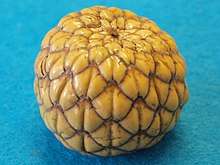Metroxylon warburgii
| Metroxylon warburgii | |
|---|---|
 | |
| Metroxylon warburgii fruit | |
| Scientific classification | |
| Kingdom: | Plantae |
| Clade: | Angiosperms |
| Clade: | Monocots |
| Clade: | Commelinids |
| Order: | Arecales |
| Family: | Arecaceae |
| Genus: | Metroxylon |
| Species: | M. warburgii |
| Binomial name | |
| Metroxylon warburgii | |
| Varieties | |
|
M. w. var tutuileansis[3] | |
| Synonyms[2] | |
|
Coelococcus warburgii Heimerl | |
Metroxylon warburgii commonly called the natangura palm,[4] is a species of flowering plant in the Arecaceae family. The specific epithet is in honor of Otto Warburg.[5] The common name is from the Bislama name natanggura.
Habitat
It is found in Solomon Islands and Vanuatu.[1] It can be found in lowland, swampy areas and the floodplains of Vanuatu, New Hebrides,[5] and Samoa. It thrives in sunny, hot environments with a lot of water, and cannot live in the cold.[3]
Growth
It is a medium-large solitary palm tree that can grow up to about 10m tall. It has spiny leaf bases and leaves that slight bend backward. The plant reaches maturity around eight years old, and is also monocarpic, which means that it can only flower once before it dies.[3]
Uses
It is widely used as a material for thatching houses.[3] The seeds are also used as vegetable ivory,[4] and in French they are called noix d'ivoire (literally: "ivory nuts").[5]
References
- 1 2 Dowe, J.L. 1998. Metroxylon warburgii. The IUCN Red List of Threatened Species 1998: e.T38611A10138103. https://dx.doi.org/10.2305/IUCN.UK.1998.RLTS.T38611A10138103.en http://www.iucnredlist.org/details/full/38611/0 . Downloaded on 23 September 2017.
- 1 2 "Metroxylon warburgii (Heimerl) Becc. — The Plant List". ThePlantList.org. 2013. Retrieved 18 August 2017.
- 1 2 3 4 "Metroxylon warburgii". PACSOA. Retrieved 19 January 2013.
- 1 2 Sentance, Bryan; Sentance, Polly (2009). "2 Central and South America". Craft Traditions of the World: Locally Made, Globally Inspiring. London, UK: Thames & Hudson. pp. 72–73. ISBN 9780500514665. OCLC 317919883.
- 1 2 3 Heimerl, Anton (13 November 1903). "Un Nouveau Coelococcus Wendl. (Palm.) des Nouvelles-Hébrides" [A new Coelococcus Wendl. (Palm.) of the New Hebrides]. Bulletin de la Société Botanique de France (in French). 50: 572–576. Retrieved 18 August 2017.
External links


